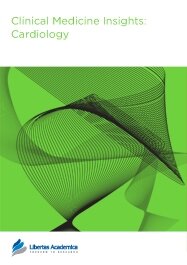

Publication Date: 14 Mar 2011
Type: Case report
Journal: Clinical Medicine Insights: Cardiology
Citation: Clinical Medicine Insights: Cardiology 2011:5 29-33
doi: 10.4137/CMC.S6130

A 50 year old male HIV patient on antiretroviral therapy was admitted for chest pain. Upon admission, the patient was found to have elevated cardiac enzymes, acute thrombocytopenia, hemolytic anemia, acute pancreatitis and acute renal failure. The patient was diagnosed with thrombotic thrombocytopenic purpura/haemolytic uremic syndrome and emergency plasma exchange therapy was initiated along with aspirin, beta-blockers, steroids, and antiretroviral therapy. Patient responded well and demonstrated complete resolution of ischemic cardiomyopathy with left ventricular ejection fraction improving from 35% to 55% by the time of discharge. Essentially, prompt diagnosis and treatment can reverse cardiac damage induced by thrombotic thrombocytopenic purpura.
PDF (1.16 MB PDF FORMAT)
RIS citation (ENDNOTE, REFERENCE MANAGER, PROCITE, REFWORKS)
BibTex citation (BIBDESK, LATEX)
XML
PMC HTML

I am impressed by the efficiency at each step of submission in the journal. Based on the first-hand experience, I am confident that this journal will have a great future, and the impact factor will rise rapidly.

All authors are surveyed after their articles are published. Authors are asked to rate their experience in a variety of areas, and their responses help us to monitor our performance. Presented here are their responses in some key areas. No 'poor' or 'very poor' responses were received; these are represented in the 'other' category.See Our Results
Copyright © 2013 Libertas Academica Ltd (except open access articles and accompanying metadata and supplementary files.)
Facebook Google+ Twitter
Pinterest Tumblr YouTube